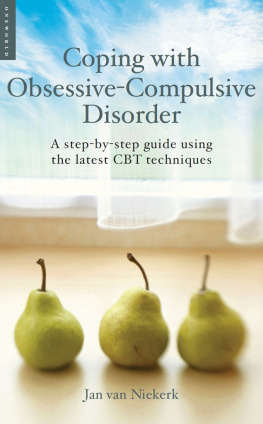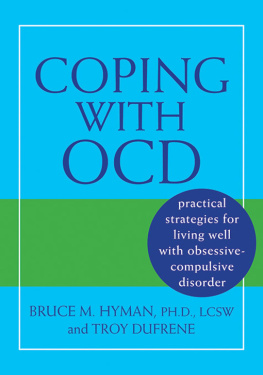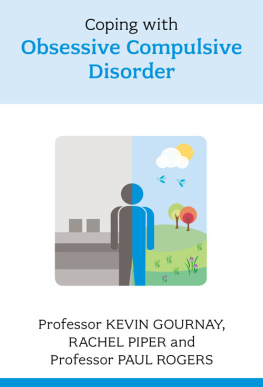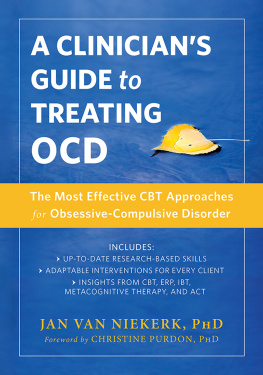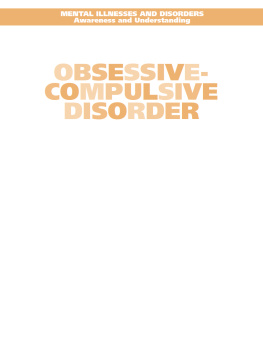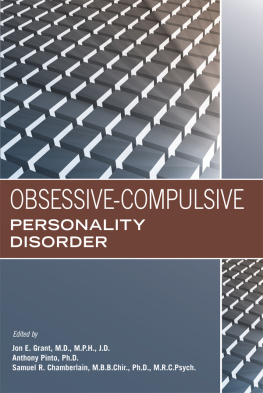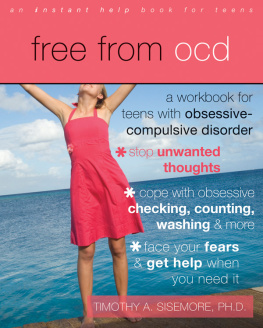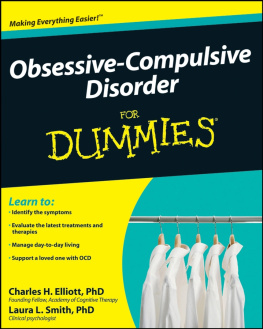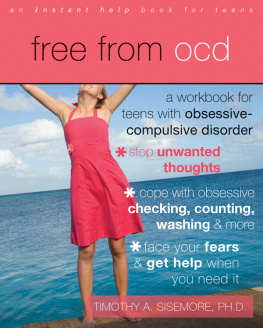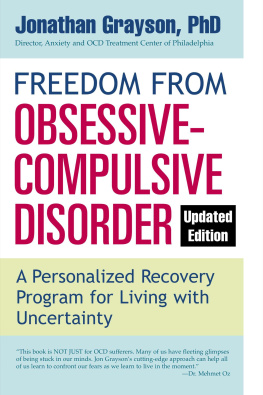Niekerk - Coping with Obsessive-Compulsive Disorder
Here you can read online Niekerk - Coping with Obsessive-Compulsive Disorder full text of the book (entire story) in english for free. Download pdf and epub, get meaning, cover and reviews about this ebook. year: 2009, publisher: Oneworld Publications, genre: Romance novel. Description of the work, (preface) as well as reviews are available. Best literature library LitArk.com created for fans of good reading and offers a wide selection of genres:
Romance novel
Science fiction
Adventure
Detective
Science
History
Home and family
Prose
Art
Politics
Computer
Non-fiction
Religion
Business
Children
Humor
Choose a favorite category and find really read worthwhile books. Enjoy immersion in the world of imagination, feel the emotions of the characters or learn something new for yourself, make an fascinating discovery.
- Book:Coping with Obsessive-Compulsive Disorder
- Author:
- Publisher:Oneworld Publications
- Genre:
- Year:2009
- Rating:3 / 5
- Favourites:Add to favourites
- Your mark:
- 60
- 1
- 2
- 3
- 4
- 5
Coping with Obsessive-Compulsive Disorder: summary, description and annotation
We offer to read an annotation, description, summary or preface (depends on what the author of the book "Coping with Obsessive-Compulsive Disorder" wrote himself). If you haven't found the necessary information about the book — write in the comments, we will try to find it.
Niekerk: author's other books
Who wrote Coping with Obsessive-Compulsive Disorder? Find out the surname, the name of the author of the book and a list of all author's works by series.
Coping with Obsessive-Compulsive Disorder — read online for free the complete book (whole text) full work
Below is the text of the book, divided by pages. System saving the place of the last page read, allows you to conveniently read the book "Coping with Obsessive-Compulsive Disorder" online for free, without having to search again every time where you left off. Put a bookmark, and you can go to the page where you finished reading at any time.
Font size:
Interval:
Bookmark:
ALSO AVAILABLE IN THE COPING WITH SERIES
Series Editor: Steven Jones, University of Lancaster
Coping with Bipolar Disorder:
A CBT-Informed Guide to Living with Manic Depression
Steven Jones, Peter Hayward and Dominic Lam
ISBN 9781851686995
Coping with Schizophrenia:
A Guide for Patients, Families and Caregivers
Steven Jones and Peter Hayward
ISBN 9781851683444
Coping with an Anxious or Depressed Child:
A Guide for Parents
Sam Cartwright-Hatton
ISBN 9781851684823
Coping with Fears and Phobias: A Step-by-Step Guide to Understanding and Facing your Anxieties
Warren Mansell
ISBN 9781851685141
Coping with Shyness and Social Phobia:
A Guide to Understanding and Overcoming Social Anxiety
W. Ray Crozier and Lynn E. Alden
ISBN 9781851685165
TO ORDER TITLES
All the titles in this series are available direct from the publisher.
Please visit www.oneworld-publications.com to order books online.

A Oneworld Paperback Original
Published by Oneworld Publications 2009
This ebook edition published in 2012
Copyright Jan van Niekerk 2009
The right of Jan van Niekerk to be identified as the Author of this work has been asserted by him in accordance with the Copyright, Designs and Patents Act 1988
All rights reserved
Copyright under Berne Convention
A CIP record for this title is available from the British Library
ISBN 9781851685158
ebook ISBN 9781780740935
Typeset by Jayvee, Trivandrum, India
Cover design by Mungo Designs
Oneworld Publications
10 Bloomsbury Street
London WC1B 3SR
England
www.oneworld-publications.com
Stay up to date with the latest books, special offers, and exclusive content from Oneworld with our monthly newsletter
Sign up on our website
www.oneworld-publications.com
This series is intended to provide clear, accessible, and practical information to individuals with a wide range of psychological disorders, as well as to their friends, relatives, and interested professionals. As the causes of emotional distress can be complex, books in this series are not designed purely to detail self-treatment information. Instead, each volume sets out to offer guidance on the relevant, evidence-based psychological approaches that are available for the particular condition under discussion. Where appropriate, suggestions are also given on how to apply particular aspects of those techniques that can be incorporated into self-help approaches. Equally important, readers are offered information on which forms of therapy are likely to be beneficial, enabling sufferers to make informed decisions about treatment options with their referring clinician.
Each book also considers aspects of the disorder that are likely to be relevant to each individuals experience of receiving treatment, including the therapeutic approaches of medical professionals, the nature of diagnosis, and the myths that might surround a particular disorder. General issues that can also affect a sufferers quality of life, such as stigma, isolation, self-care and relationships are also covered in many of the volumes.
The books in this series are not intended to replace therapists, since many individuals will need a personal treatment programme from a qualified clinician. However, each title offers individually tailored strategies, devised by highly experienced practising clinicians, predominantly based on the latest techniques of cognitive-behavioural therapy, which have been shown to be extremely effective in changing the way sufferers think about themselves and their problems. In addition, titles also include a variety of practical features such as rating scales and diary sheets, helpful case studies drawn from real life, and a wide range of up-to-date resources including self-help groups, recommended reading, and useful websites. Consequently, each book provides the necessary materials for sufferers to become active participants in their own care, enabling constructive engagement with clinical professionals when needed and, when appropriate, to take independent action.
Dr Steven Jones
Series Editor
A successful self-help book needs to resemble good therapy identifying the personal nature of the problem, addressing specific and non-specific factors alike, and interacting with the person at their own pace to provide a learning experience that installs autonomous skills.
Jan van Niekerks self-help guide for people with obsessive-compulsive disorder (OCD) not only accomplishes all this but contains numerous novel features. The guide begins with a very readable and comprehensive description of OCD to enable readers to recognize themselves and move on to managing the disorder. The author then presents the major current cognitive-behavioural therapy (CBT) models and renders theoretically distinct approaches clinically accessible and blendable through down-to-earth explanations and practical engaging exercises.
The book moves seamlessly through different stages of the therapeutic process covering both the attention to detail necessary for successful application of techniques through to the more holistic level of lifestyle choice and improved overall functioning required to sustain long-term change. Throughout the text the reader is conscious of the presence of the author through personalized advice and comments guiding us over the gradients and troughs of self-control. The reader is never alone, and the presence of the case examples illustrates well the experience of the therapy across different manifestions of OCD and adds to the good company.
I had the pleasure of meeting Jan van Niekerk when he spent a short time with our team in Montreal in the summer of 2006. He had contacted us on his own initiative to follow up on articles he had read on our inference-based approach (IBA) (see OConnor et al., 2005). This approach developed from our clinical observations that most OCD did not seem to fit a phobic model and the fear was more about what the person inferred might be there than what was there in reality. In OCD, the person concludes that, for example, a hand was dirty or a door not locked or an object was badly placed, on the basis of a subjective story remote from the here-and-now which bypassed the usual information-gathering, a process we term inferential confusion. A more fundamental self-doubt such as I could be someone who makes mistakes, does harm, is negligent, may lie behind the specific obsessional doubt; a self-inference also remote from the real self (Aardema and OConnor, 2007).
Jan van Niekerk describes the IBA procedures (Chapter 5) to identify obsessional doubt and reasoning errors which lead to confusing inferences. But he also integrates IBA along with existing work on inflated responsibility, what the obsessional fears mean about the person, thoughtaction fusion, the effects of metacognitive control strategies, metacognitive appraisal, the effects of compulsive checking on memory confidence, and response prevention strategies (all in Chapters 57). Chapter 8 describes the methods of exposure and response prevention therapy as a stand-alone treatment option, offering the reader a choice between CBT and this older, but powerful treatment approach. In fact, all the therapy techniques sit well together and make this guide a unique up-to-date comprehensive text nicely blending old and new. However, the textbook principles are brought alive by his practical tips, informal asides and pick-me-up helplines, which seem to catch the reader and pull us up just at the right moment to keep motivation and mood high and progress steady.
Font size:
Interval:
Bookmark:
Similar books «Coping with Obsessive-Compulsive Disorder»
Look at similar books to Coping with Obsessive-Compulsive Disorder. We have selected literature similar in name and meaning in the hope of providing readers with more options to find new, interesting, not yet read works.
Discussion, reviews of the book Coping with Obsessive-Compulsive Disorder and just readers' own opinions. Leave your comments, write what you think about the work, its meaning or the main characters. Specify what exactly you liked and what you didn't like, and why you think so.

